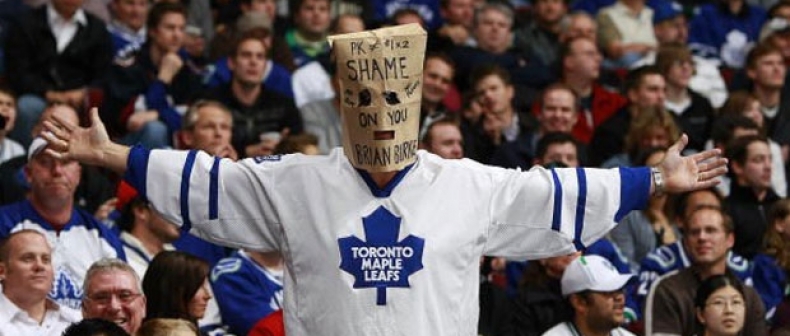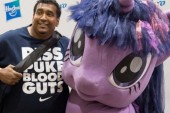
Another year, another disappointment. As yet another lost season for the Toronto Maple Leafs sputters toward its merciful conclusion, their long-suffering fans are left with nothing to do but figure out whom to blame.
The coach who couldn’t right the ship when the losses started to pile up? He’s been fired already. The bombastic general manager who seemingly has nothing better to do with his time than get into shouting matches with Don Cherry? He might be next. The goaltenders who frequently look as though they are actually afraid of hockey pucks? They could be replaced by next year as well.
And yet, to really understand why the Leafs still, well, stink, after all these years, fans should look no further than to the answer of the following trivia question:
What do Scott Niedermayer, Roberto Luongo, and Tyler Seguin have in common?
If you said that they were each all-stars who at different times would have (easily) been the best player in the entire Maple Leafs organization, you’d be half-right. The true common denominator among these three players, however, is that they actually all should have been Maple Leafs. Yes, all three were selected in the top five picks of the NHL draft with selections that the Maple Leafs originally owned but traded away.
The Seguin pick was obviously traded as part of the king’s ransom shipped to Boston for Phil Kessel, which Brian Burke still absurdly defends as a smart move. For the draft pick that became Roberto Luongo, the Leafs got Wendel Clark back, for the second of three stints with the team. And for the number three pick in the 1991 draft that became Scott Niedermayer? Well for that, the Leafs received a little over a season of the services of the immortal…wait for it…Tom Kurvers.
If this pathetic history of the past twenty years shows anything, it’s that the Maple Leafs as an organization have consistently proven that when it comes to building a winner, they simply don’t get it. Time and again, they’ve mortgaged the future for band-aids and cast-offs, never adopting a coherent long-term strategy for success.
Through it all, there have been a few highs (such as a couple of deeper-than-expected playoff runs in the 1990s) and a lot of lows (for example, any move that John Ferguson, Jr. ever made), but the sad fact is that the Leafs have never come close to looking like a champion. And when you look around the league at the teams that have actually competed for the Stanley Cup over the years, the difference in talent is glaring.
Most of those teams were willing to take their lumps to acquire that talent, however. The Penguins had to hit rock bottom before they got Sidney Crosby and Evgeni Malkin. Ditto the Blackhawks with Jonathan Toews and Patrick Kane. And the Canucks with the Sedin twins. With the Leafs, there is never even that option, because they’ve always bartered away the opportunity to be great tomorrow for a chance to be decent today. That is no way to build any kind of organization, let alone a hockey team that boasts one of the most devoted followings in the entire sporting world.
This is not just the benefit of hindsight, either. Personally speaking, it became a yearly tradition for me to call up my father, a Leafs fan that has suffered for much longer than I, to commiserate over the team’s latest shortsighted blunder (We traded what for Andrew Raycroft?…We traded what for Vesa Toskala?…We traded what for Kessel?) When it’s that obvious to the fans, it really is a wonder that the guys who do this for a living can’t figure it out.
And yet, the Leafs organization continues to be celebrated for its business savvy, in building what is the most valuable professional hockey franchise in the world. Never mind that selling hockey in Toronto is easier than selling drugs to Charlie Sheen, or that the team would make a hell of a lot more money if it actually put a winning product on the ice. In any other city, the executives responsible for such a mess would have long ago lost their jobs.
So as another failed season ends and the post-mortem begins, the desire to find a scapegoat will be very strong. The harsh reality is, however, that this Leafs season was really no different from the many seasons that came before: the direct result of an organizational culture that strives for mediocrity, and in the best of times attains it.
______
Matthew Frisch writes for Toronto Standard. Follow him @mfrisch.
For more, follow us on Twitter at @TorontoStandard and subscribe to our newsletter.














